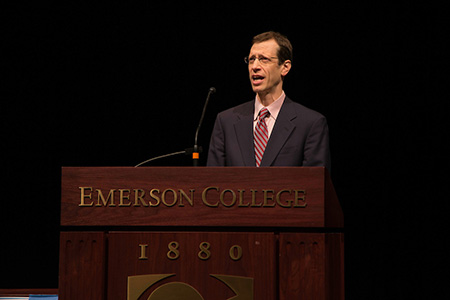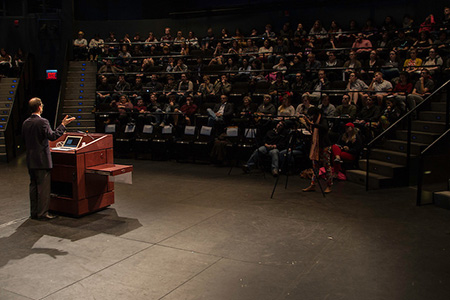Pollster hashes out midterm election results

Mark Blumenthal, senior pollster for the Huffington Post, lectured November 12 about the recent midterm elections. (Photo by Tyler McAndrew ’16)
Mark Blumenthal, senior pollster for the Huffington Post, provided in-depth analysis of the recent national midterm elections November 12 in a well-attended discussion event at the Semel Theater, which was organized by the Emerson College Polling Society.
“This is a remarkably good turnout for a polling nerd,” Blumenthal said. “Thank you.”
The big news nationally out of the November 4 election was that Republicans gained the majority of both the House of Representatives and Senate—something Blumenthal said should not have been a surprise from a historical perspective.
“The sixth year for a (two-term) president is almost always bad for his party,” and has been that way for every president since the Civil War, Blumenthal said. “The only exception was Bill Clinton in 1998 when the economy was roaring along, and Republicans were trying to impeach him… when he had a 60 percent approval rating.”

Mark Blumenthal, senior pollster for the Huffington Post, speaks with students at the Semel Theater on November 12. (Photo by Tyler McAndrew ’16)
Blumenthal unleashed a plethora of graphs, charts, and figures about the recent election during his hour-long talk, prompting questions from students on a variety of issues.
Among the information he shared:
· “The single biggest theme was a pervasive sense of economic pessimism,” among Americans, with 78 percent “worried” about the economy, and 38 percent “very worried,” according to national exit polls. “These are remarkably bad numbers,” Blumenthal said.
· 79 percent of Americans only trust government “sometimes or never” (national exit poll.)
· The top political issue for voters overall and Republicans was the economy, but for Democrats it was social and women’s issues. (YouGov/Huffington Post)
· President Obama’s job approval rating is 44 percent, with 55 percent disapproving.
Blumenthal said the president’s job approval rating traditionally has a big impact on members of his party, including this recent election.
“In almost every case, the (Democratic) candidates only got a little bit better (percentage of the vote) than the president’s job approval rating,” he said.
Emerson’s Office of Development and Alumni Relations is trying to raise $5,000 to help fund future work of the Emerson College Polling Society, and is close to meeting that goal.
Categories